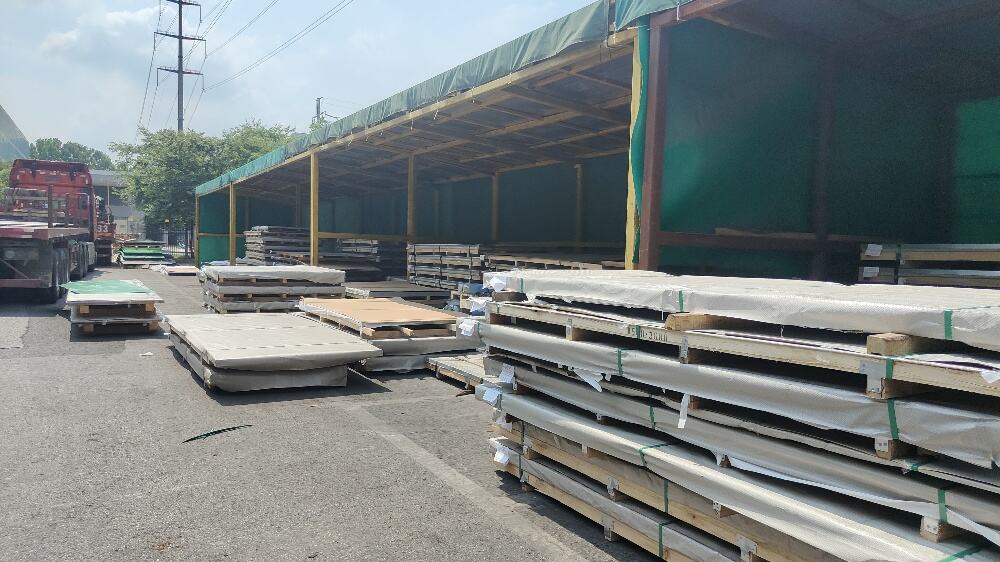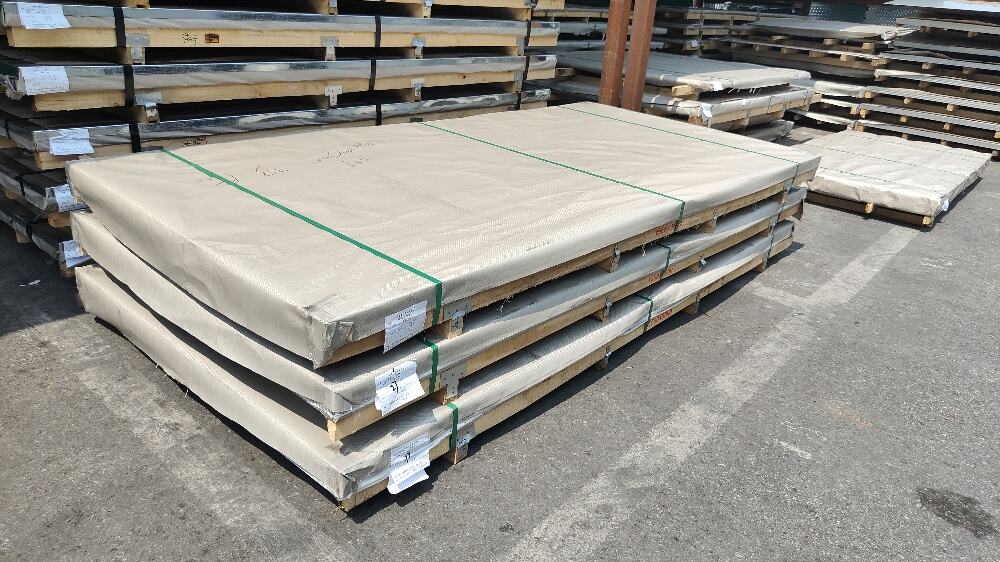एक पेशेवर के रूप में स्टेनलेस स्टील कारखाना , हम अक्सर ग्राहकों से 420J1 और 420J2 के चयन के बारे में पूछताछ प्राप्त करते हैं स्टेनलेस स्टील प्लेट . दोनों सामग्री मार्टेन्साइटिक के अन्तर्गत आती हैं स्टेनलेस स्टील श्रृंखला और कठिनाई, कोरोशन प्रतिरोध, और मशीनी करने की क्षमता के अंगreb के अंतर्गत अपने-अपने विशेषताएं हैं। तो, 420J1 और 420J2 स्टेनलेस स्टील प्लेट के बीच विशिष्ट अंतर क्या हैं? चलिए साथ में एक नज़र डालते हैं!

420J1 और 420J2 स्टेनलेस स्टील की परिभाषा
दोनों 420j1 और 420j2 कम कार्बन मार्टेनसाइटिक स्टेनलेस स्टील हैं, जो स्टेनलेस स्टील की 420 श्रृंखला के प्रकार हैं।
420j1 में अच्छी कठोरता, टोफ़ेदारी और सबजी प्रतिरोधकता होती है, और यह माध्यम और कम ताकत की मांग के लिए आमतौर पर उपयोग की जाने वाली सामग्री है। मुख्य विशेषता 420J1 स्टेनलेस स्टील यह है कि यह अच्छी प्रोसेसिंग क्षमता, उच्च ऑक्सीकरण प्रतिरोधकता और सबजी प्रतिरोधकता रखते हुए एक निश्चित ताकत और कठोरता को बनाए रख सकता है।
420j2 की मुख्य विशेषता यह है कि इसमें 420J1 की तुलना में थोड़ा अधिक कार्बन होता है, आमतौर पर 0.20% से 0.30% के बीच। यह 420J2 स्टेनलेस स्टील को सुधारी हुई कठोरता और ताकत देता है, जबकि यह अच्छी सबजी प्रतिरोधकता और प्रोसेसिंग क्षमता बनाए रखता है।
रासायनिक संरचना
|
तत्व
|
420J1
|
420J2
|
कार्य
|
|
सी
|
0.16 - 0.25
|
0.26 - 0.40
|
कठोरता और ताकत को निर्धारित करता है; अधिक कार्बन अधिक कठोरता बढ़ाता है।
|
|
सीआर
|
12 - 14
|
12 - 14
|
कोरोशन प्रतिरोध और ऑक्सीडेशन प्रतिरोध में सुधार करता है।
|
|
एमएन
|
≤1.0
|
≤1.0
|
गरम कार्य प्रदर्शन में सुधार करता है और कठोरता में वृद्धि करता है।
|
|
हाँ
|
≤1.0
|
≤1.0
|
शक्ति और कठोरता में वृद्धि करता है।
|
|
प
|
≤0.04
|
≤0.04
|
अधिक फॉस्फरस कटुता बढ़ा सकता है और इसे कड़े प्रबंध में रखना चाहिए।
|
|
एस
|
≤0.03
|
≤0.03
|
कम सामग्री मशीनी करने की क्षमता में सुधार करती है।
|
420J1 में कार्बन की कम मात्रा होती है, आमतौर पर 0.15%-0.25% के बीच। कम कार्बन मात्रा इसे बेहतर कठोरता और लचीलापन देती है, जबकि कोरोशन प्रतिरोध पर कम प्रभाव पड़ता है।
420J2 में उच्च कार्बन मात्रा होती है, आमतौर पर 0.26% से 0.40% के बीच। उच्च कार्बन मात्रा कठोरता और सहनशीलता में महत्वपूर्ण सुधार करती है, लेकिन कठोरता और लचीलापन में कमी आती है।
यांत्रिक गुणों की तुलना
|
यांत्रिक गुण
|
420J1
|
420J2
|
|
कठोरता (HRC)
|
35-45
|
50-56
|
|
तन्य शक्ति (एमपीए)
|
600-800
|
800-1000
|
|
डक्टिलिटी (%)
|
उच्च
|
कम
|
|
अड़चन मजबूती
|
उच्च
|
सापेक्ष रूप से कम
|
गर्मी का उपचार विशेषताएँ
420J1 और 420J2 मार्टेन्साइटिक स्टेनलेस स्टील हैं, और उनके तापन उपचार का मुख्य उद्देश्य सामग्री की कठोरता और सफ़ेदी प्रतिरोध को बढ़ाना है। कार्बन की मात्रा के कारण दोनों का तापन तापमान विस्तार कुछ अलग है, लेकिन आम तौर पर समान है। निम्नलिखित दोनों सामग्रियों के लिए सुझाए गए तापन तापमान विस्तार हैं:
 420J1 तापन तापमान
420J1 तापन तापमान
तापमान विस्तार: 980℃ - 1050℃
420J1 में कम कार्बन मात्रा (0.15%-0.25%) होती है। उपरोक्त तापमान तक गर्म करने के बाद, कार्बाइड्स पूरी तरह से ऑस्टेनाइट में घुल जाते हैं ताकि एक समान मार्टेन्साइटिक संरचना बन सके।
शीतन विधि: तेल शीतन या हवा शीतन का उपयोग आम तौर पर किया जाता है ताकि उपयुक्त कठोरता सुनिश्चित हो जबकि फटने के खतरे से बचा जा सके।
 420J2 तापन तापमान
420J2 तापन तापमान
तापमान विस्तार: 1000℃ - 1080℃
420J2 में उच्च कार्बन विशिष्टता (0.26%-0.40%) होती है, इसलिए पूर्ण रूप से कार्बाइड को घुलाने के लिए उच्च तापमान पर तप्त करना आवश्यक है।
ठंडा करने की विधि: तेल ठंडा करना आमतौर पर अधिक कठोरता के लिए तेज़ ठंडा करने के लिए उपयोग किया जाता है, लेकिन ध्यान देना चाहिए कि बहुत तेज़ ठंडा करना फटने का कारण बन सकता है।
 ऊष्मीय उपचार के मुख्य बिंदु
ऊष्मीय उपचार के मुख्य बिंदु
तापमान बढ़ाने की दर: तापमान को समान रूप से बढ़ाना चाहिए ताकि अतिरिक्त आंतरिक तापमान अंतर से तनाव और विकृति से बचा जा सके।
अवस्थिति काल: तापमान को तप्त करने के तापमान पर कुछ समय के लिए रखें ताकि कार्बाइड पूर्ण रूप से घुल जाए, लेकिन बहुत लंबा समय अधिक अणुओं के विकास का कारण बन सकता है।
 ठंडा करने की विधि का चयन:
ठंडा करने की विधि का चयन:
तेल ठंडा करना: उच्च कठोरता वाले कार्यक्रमों के लिए उपयोग किया जाता है, जैसे कि उपकरण और औद्योगिक भाग।
हवा से ठंडा करना: फटने के खतरे को कम करने के लिए कार्यक्रमों के लिए उपयोग किया जाता है, जैसे कि पतले दीवार वाले भाग।
 तप्त करने के बाद कठोरता की प्रदर्शन
तप्त करने के बाद कठोरता की प्रदर्शन
420J1: डिब्ज़िंग के बाद कठोरता आमतौर पर 35-45HRC तक पहुंच सकती है, जो उच्च टफ़्नेस की मांगों वाले परिस्थितियों के लिए उपयुक्त है।
420J2: डिब्ज़िंग के बाद कठोरता आमतौर पर 50-56HRC होती है, जो उच्च कठोरता और सहनशीलता की मांगों वाले परिस्थितियों के लिए उपयुक्त है।
विशेष उपयोग और प्रदर्शन मांगों के अनुसार, डिब्ज़िंग के बाद टेम्परिंग उपचार किया जा सकता है ताकि कठोरता और टफ़्नेस के बीच संतुलन को समायोजित किया जा सके।
सड़न की प्रतिरोधकता की तुलना:
हालांकि 420J1 और 420J2 की क्रोमियम मात्रा समान है, कार्बन मात्रा का फ़र्क सड़न की प्रतिरोधकता पर प्रभाव डालता है।
 420J1: कार्बन मात्रा कम होती है, आंतरिक संरचना में कम कार्बाइड का उत्सर्जन होता है और सतह अधिक समान होती है, इसलिए यह कमज़ोर एसिड, कमज़ोर क्षार और नम परिवेश में बेहतर प्रदर्शन करती है।
420J1: कार्बन मात्रा कम होती है, आंतरिक संरचना में कम कार्बाइड का उत्सर्जन होता है और सतह अधिक समान होती है, इसलिए यह कमज़ोर एसिड, कमज़ोर क्षार और नम परिवेश में बेहतर प्रदर्शन करती है।
 420J2: उच्च कार्बन मात्रा कार्बाइड के उत्सर्जन को बढ़ाती है, जो संभवतः सड़न का प्रारंभिक बिंदु बन सकते हैं, इस प्रकार सड़न की प्रतिरोधकता कम हो जाती है।
420J2: उच्च कार्बन मात्रा कार्बाइड के उत्सर्जन को बढ़ाती है, जो संभवतः सड़न का प्रारंभिक बिंदु बन सकते हैं, इस प्रकार सड़न की प्रतिरोधकता कम हो जाती है।
इसलिए, एक कमजोर रूप से कारोबारी पर्यावरण (जैसे आर्द्र हवा) में, दोनों सामग्रियाँ समान रूप से कार्य करती हैं। एक क्लोराइड-युक्त या अम्लीय पर्यावरण में, 420J1 बेहतर प्रदर्शन करता है।
आवेदन क्षेत्र
|
आवेदन क्षेत्र
|
420J1
|
420J2
|
|
मेज
|
चमकीले और आसान प्रसंस्करण वाले चार्क, चम्मच, प्लेट
|
उच्च कठिनता वाले किचन चाकू, रेज़र ब्लेड
|
|
सजावटी घटक
|
चमकीले स्टेनलेस स्टील के आभूषण या फिटिंग
|
सहनशीलता वाले औद्योगिक उपकरण
|
|
यांत्रिक भाग
|
अच्छी मशीनिंग क्षमता वाले हल्के भार के घटक
|
सहनशीलता चाहिए वाले भारी भार के घटक
|

हालांकि 420J1 और 420J2 स्टेनलेस स्टील की 420 श्रृंखला के अंतर्गत आते हैं, वे कार्बन सामग्री, कठिनता, सहनशीलता और ऊष्मा उपचार के कारण व्यावहारिक अनुप्रयोगों में अपने विशिष्ट फायदे दिखाते हैं। एक पेशेवर के रूप में स्टेनलेस स्टील कारखाना, हम ग्राहकों को उनकी विशेष जरूरतों के अनुसार उपयुक्त सामग्रियों का चयन करने की सलाह देते हैं। एक साथ, हम तकनीकी समर्थन और सजातीय सेवाओं की पेशकश कर सकते हैं ताकि सामग्री का प्रदर्शन आपके उत्पाद आवश्यकताओं को अधिकतम तक पहुँचा सके।
हम विभिन्न स्टील उत्पादों के व्यापक विनिर्दिष्ट विनिर्माणकर्ता हैं। हमसे संपर्क करने में स्वागत है!
 +86 17611015797 (व्हाट्सएप)
+86 17611015797 (व्हाट्सएप)  info@steelgroups.com
info@steelgroups.com
